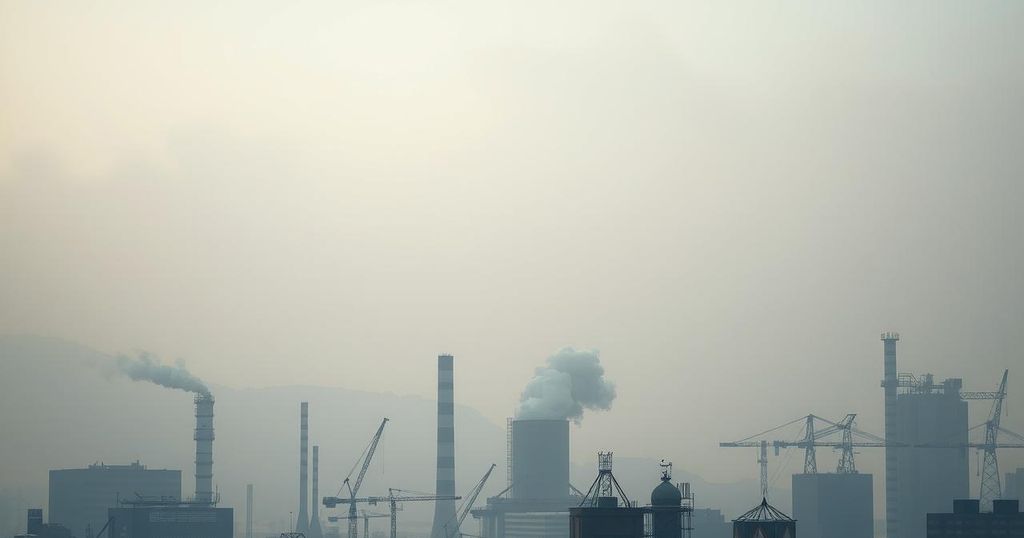Ghana, Nigeria, Chad, and Rwanda Lead in Global Air Pollution Crisis
The 2024 World Air Quality Report reveals that Ghana, Nigeria, Chad, and Rwanda rank among the most polluted countries worldwide, with Chad recording alarming PM2.5 levels of 91.8 µg/m³. Ghana’s air quality has significantly deteriorated over recent years, highlighting an urgent need for effective intervention. The report emphasizes public health risks and economic costs associated with air pollution in Africa.
The 2024 World Air Quality Report indicates a severe pollution crisis in Africa, with countries like Ghana, Nigeria, Chad, and Rwanda among the worst affected globally. Chad ranks first, exhibiting a shocking PM2.5 concentration of 91.8 µg/m³, which is significantly higher than the World Health Organization’s (WHO) acceptable level of 5 µg/m³. Nigeria, Rwanda, and Ghana follow, with PM2.5 levels of 40.1 µg/m³, 40.8 µg/m³, and 35.8 µg/m³, respectively. This alarming trend threatens millions of lives and highlights the urgent need for action to address air quality issues across the continent.
Ghana’s air quality is notably deteriorating, with pollution levels now seven times higher than WHO’s standards. Accra, previously identified as the most polluted city, has been overtaken by Kumasi, which recorded a PM2.5 level of 39.5 µg/m³. Ghana’s pollution levels have consistently increased over the past three years, exemplified by a rise from 30.2 µg/m³ in 2022, to 33.2 µg/m³ in 2023, reaching 35.8 µg/m³ in 2024, thus ranking 14th worldwide.
The 2024 report paints a grim picture of Africa’s air quality, illustrating that five of the ten most polluted countries are on the continent, with limited air quality monitoring complicating the scenario. A mere 24 out of 54 African nations reported data, revealing that 34% of urban areas experienced PM2.5 levels significantly exceeding recommended guidelines, with prominent cities like Lagos suffering from data gaps.
Air pollution has emerged as a public health emergency in Ghana. Estimates suggest that 28,000 lives are lost annually due to this crisis, with severe health effects including respiratory diseases and economic ramifications projected to cost the economy $137.8 billion by 2040. Without intervention, the pollution crisis is likely to exacerbate and threaten public health further.
Globally, only 17% of cities meet WHO air quality recommendations, even as some regions maintain better air quality. The report ranks Chad, Bangladesh, Pakistan, and others as the most polluted, while countries like Australia and New Zealand adhere to safe limits. Factors including rapid urbanization and unregulated industrial activity are contributing to Africa’s worsening air quality.
There is an increasing call for Ghana to implement stricter environmental regulations and more effective policies. Experts advocate for enhanced vehicle emission standards, increased investment in renewable energy, and the establishment of more air quality monitoring facilities. The situation demands immediate actions to reverse the alarming trends in pollution and safeguard public health in Ghana and beyond.
In summary, the worsening air quality crisis in Ghana and several African nations poses a significant threat to public health and the economy. With Chad, Nigeria, Rwanda, and Ghana ranking among the world’s most polluted countries, urgent measures are required to address this environmental health crisis. Strengthening regulations, investing in renewable energy, and enhancing air quality monitoring are critical steps that must be taken to mitigate the dire impacts of pollution on millions of lives across the continent.
Original Source: www.myjoyonline.com




Post Comment